- Home
- China Miéville
This Census-Taker Page 10
This Census-Taker Read online
Page 10
“One thing I do have to count,” he said, “is spouses.”
He took out a tube of glass or clear plastic the size of a hammer handle and pressed something, shook it, and the cylinder glowed. It went quickly, coldly bright.
I climbed over the entrance rocks and came into the cave toward him.
The man held out the stick of light and dropped it into the hole.
I gasped to see it plummet, fleetingly illuminating the jagged rock sides, dwindling, knocking loudly end to end on the stone until it was invisible.
We watched. The man exhaled.
He took out a flashlight, thick rope, hooks and spikes and buckled leather for his chest, into which he shrugged. I watched with some growing emotion.
“No one can go down,” I said.
“Yes, well, I have a job,” he said. He hammered clasps into the rock. “I have to count. I have to track everything.”
He attached hooks and the cord to these anchors. He spooled it around his harness.
“You can’t,” I said desperately. “You can’t.”
“Do you know how you could help me?” he said. “You know what I need? You should listen. Can you do that? Listen as hard as you can. And if anyone’s coming you should shout down and tell me.”
He gave me another of the tubes. It was pleasing and heavy in my hand. I could see two just-distinct clear liquids inside. “If you hear anyone, you press this.” A plunger to crack the wall between the chambers. “Can you do that? Then you shake it and drop it right in.”
“What if I hit you?”
“Then I’ll have a bump on my head.” He made a silly face.
“What if it breaks on the rocks?” He shook his head and tapped it on the rock to show me it was tough.
“But you won’t turn it on unless you hear someone?” he said.
I promised.
He took his glasses off and cleaned them and put them on again. He wound the strap of his flashlight around his wrist.
“Let’s see,” he said. “Well now.”
Spooling out the line, the man stepped over the lip into the hole.
He moved fast, keeping the line taut with one arm while he braced himself expertly against outcroppings and in nooks with the other and with his legs, and scuttled down the stone.
The dark took him. I watched the line tremble and stretch.
I watched his glow go down.
I couldn’t hear him any more but for a minute his light switched back and forth in the pit, once shining right up out of it and into my eyes. Then he turned it off or passed below an overhang.
The cord thrummed.
In my mind I saw him, a tiny figure suspended and sinking in a great chamber toward the pile. I imagined him shining his light down at it.
I thought there might be sounds from the hill path outside. I was afraid. That my father was returning.
And I imagined the man touching down on the dreadful hill inside the hill and I thought of what I would do if my father came and found me now, waiting there, and of what he might do. I started to shake as if I was frozen cold. I didn’t know whether because of the thought of what the man would find or of the thought of my father finding me.
If my father said something, what would I say back?
I’d try hard not to look at the line stretching down. I’d keep my eyes from the hole. But that wouldn’t distract him. He would see the line. He’d look straight at it and a terrible expression would come over him, not the calm he wore when killing but anger that there was an intruder and a great determination not to let the man have the knowledge for which he was searching, and my father would pull a knife from his pocket and go toward the cord to cut it.
So would I struggle with him? He would throw me down into the gap if I did, killing me in a new rageful way. I resolved that I would struggle with him, that I’d try to stop his knife and give the man time to come up again. I was afraid that I wouldn’t be brave enough.
I stood alone and held the tube, ready to make it glow, ready to drop it.
There were animals close by and I could hear the sounds of the hillside but, though I thought I did, many times, I didn’t hear my father returning. I stood in the cave for minutes, for an hour, for more than an hour. I watched the daylight change outside.
Down in the ground, perhaps the man climbed. Or did he dig?
I stared at nothing in the shadow in the hill. I was racked by scenes, moments that I didn’t want to imagine, the man’s story now, his under-hill investigations. I wanted not to imagine anything like the whispering and snarling dead who filled my head, dead people clotting in a great pile, sliding over the house trash like a band of murdered animals gone blind and stupid with rage in the darkness, furious with anyone still alive, a familiar figure at their head.
The stretched cord’s noises, its creaks and snaps, changed. It vibrated more quickly. The man was ascending.
I pictured him bracing. Climbing.
“Quick,” I struggled to whisper, into the hole. I spoke in a tiny voice. “I think my father’s coming. I keep hearing noises. You have to hurry.”
No light came up. The man had been in darkness down there, and he was ascending in darkness.
The man was ascending, I thought, and then I thought, What if the man isn’t ascending?
What if it isn’t him rising?
How long might they have been waiting down there? Waiting to overpower whoever brought a way out, ingrate escapees. Little sounds welled out of my throat and the black welled up out of the gap. The light-tube shook in my grip.
I knew who would climb first, who would be at the front of the mass, whose ruined fingers and nails it would be slapping onto the sharp flint at the edges of the crack, who would rise out of the under-hill to meet my eye, whose cold grave-stained face full of disappointment.
But it was the foreign man who came into my view like a fish below a boat. I saw him when he was already close to me. He turned his face up and I saw it paler than the shadow.
He gathered the cord and gripped the rock and found handholds. I couldn’t believe that he was returning.
The man hauled himself at last out of the ground, lying at the cut’s edge, panting and staring around him and blinking quickly. I could smell no miasma on him.
After a while he pulled a cloth from his pocket and wiped his hands very carefully, then his face. He took off his glasses and cleaned them again and wouldn’t look at me. His clothes were coated in dust from under the world.
He gathered himself and shrugged out of his harness. I couldn’t speak and he said nothing. His face was set. He worked his jaw.
“I heard what you said to me,” he said at last. “When I was on my way up. Your father will come home soon, I think.”
He put everything back in his sack.
“I think you shouldn’t go back to the house,” he said. He still didn’t look at me. “You know I have to do this job. I want to speak to your father now. I think it would be better if we could speak alone.”
—
“You can’t go in,” I whispered. “It’s not allowed.”
“I know,” he said. “I’ll wait for him outside. I promise I’ll stay on the step.” He kept looking at the cave mouth. “I’ll wait for him and ask him if he’ll let me come inside. And if he won’t I’ll talk to him right there. But I want you to stay here, now. All right?”
He looked across the hole at the dark of the hollow beyond, and back at me at last, at my little limbs.
“Well,” he said. “Is there somewhere you can go? Quiet? Out of sight? Just to make sure your father doesn’t…” He put his finger to his lips. “I want you to stay quiet. Keep your ears open, I can call you after I’ve asked your father those questions.”
“I’ll find somewhere.” I was wondering about the crook of a tree, some bough.
“Where you can’t be seen?” he said. “Make sure it’s not too close.”
His insistence frightened me. I couldn’t sit anywhere in the dusk
for my father to see me watching. “I don’t know,” I said. But he was distracted, so I said, “I’ll find a place.”
“Good.” He nodded. He picked up his pack and walked into the last of the afternoon. I followed, screwing up my eyes. But as I watched him stride out of sight down the hill I stopped, still within the cave mouth.
These felt very much like last moments. And I was very tired and I didn’t want the light on me.
Had I been in the house I would have gone into the parlor and closed the door. Or I would have wrapped old sheets around me in the base of a wardrobe. I couldn’t go back to the house.
The hole watched me, above its discards and the insides of the hill. Despite what it contained, I took a step back toward it.
It wasn’t my friend or my enemy. It was only a rip full of stone and old things. Even with a particular thing. I didn’t want it but I didn’t need to run from it, not then, and I was afraid of it but no more than I was afraid of everything. Just then, before the conversation between the stranger and my father, I was less afraid of it than of stepping out into the light.
I walked back toward the blackness. I whispered into it, in case my mother was listening.
If he came in here my father would see me and reach for me. I threw a stone across the wide split to the ridge beyond.
With as long a run-up as I could take I might be able to jump all the way across, but the floor was uneven and I might trip on my way and pitch forward, or reach the other side but tip back, and go down, into the dark to the other peak.
The cave wall had its handholds. Outside the sun was firing up the flanks of the hill and somewhere on them my father was coming back to the house, where by the front door the man in his dusty suit was waiting. I couldn’t climb into the pantry and there were no hollow trees nearby.
I took hold of the wall. It felt easier to hold myself there than it had before. I gripped. I sidled, trembling, and I kept going, and tried very hard not to think as I held tight on to the outcrops that I was now above the hole. I didn’t look behind me or down. I grabbed the extrusions and shuffled my poor feet like little animals into nooks and leaned on them to see if they’d take me, striving for the right pace, slow enough that I would not fall, quick enough that this would be over soon.
—
It was. I was there in the dark beyond the gap.
I pushed myself backward off the rock and landed in the rear part of the cave, the hollow beyond the pit, where I’d never been. I lay a long time gasping in the cold of the passage, trying to still my shaking limbs.
It was another country. I stared across at places I’d stood before. I was giddy and proud. I regarded the hole. I turned and went deeper into the hill, pausing to let my eyes adjust in shadows that were dense enough that I hallucinated, only a little, tiny points of light that weren’t there.
I thought of kingdoms and crystal caves and the tunnel continued a few meters and the walls narrowed and I was in a shaft, a wedge which then closed up altogether so I had stone against my chest and my back and I tried a moment to press on, luxuriating in the terror of it, the sense that the hill had paused and would at any moment flex and offhandedly crush me.
So I stopped and pulled out of that embrace and sat with my back to the curving cold wall behind the hole, where my father couldn’t touch me. I looked all the way out to where there was light. So deep in the hill even the waning light of the day glowed like a star. I waited.
—
He’s here to count. There’s a counting game, and I whispered its words as crows and magpies landed at the cave mouth, too effaced by light to be much as silhouettes, nothing more than ragged arrivals at the edge of darkness that I recognized by their calls. I sang a song you sing when you play a game of throwing stones. “Up the wall and down the well and in the boy and out the girl.”
I heard my father.
He called me. I put my hands over my mouth.
He was shouting. My heartbeat was hard enough to make me quake because there he was, a shadow at the entrance, only a little clearer than the fleeing birds. His legs were apart, his hands were up, braced on the top of the stone.
“You know what I hear?” he shouted. “That there’s a man here! Why’s he not long gone with the other tallymen? Why’d you let him in? Know what I hear about this census-taker? This man you’ve let come? Know what I hear?”
He had not gone to the house, he had come straight to the hole, to me. How did he know where I would be, when even I hadn’t? I held my mouth shut with my fingers.
“In town they told me there’s a man who’s come asking questions and they say he came here to speak to you. Where are you? What’ve you said to him? What’s he doing here asking what isn’t his business?”
It was his business. The man had said. My father stepped into the tunnel. He seemed to fill it, to block the light. “Come on!” He shouted louder than I knew he could. “Where are you? They were recalled! Why’s this one still counting? This man thinks he knows what I’ve done? When? Always?”
I didn’t speak or move. I was before him, against the rock, motionless in the dark shadow beyond the hole, a new place. He came to the edge of the rubbish pit and still he didn’t see me there in front of him with my hands up.
“He’s waiting to talk to me?” he shouted. “Is that right? Is that what I hear?”
He turned at last. I watched his back. He was still calling when he walked away.
“I’ll talk, then,” he yelled to the hillside. “You better come find me. You better come talk too. To me.”
I stayed quiet until I was certain he was beyond hearing then slumped and my held breath came out in a long whine. It was a long time until my trembling started to ebb at last and I could whisper another game song.
Very slowly the light in the cave mouth waned and I was more able to see the entrance itself, now that glow no longer effaced it. It was like an open eye, I thought—then I thought, No, it’s like a closed eye. Abruptly and precisely it was like the oval shape I see when I shut my eyes tight, the ebbing red glow like an opening leading into or out of something. I closed my eyes then but it was too dark to clearly see that vision that my body would conjure out of blood and the inside of skin when light hit it, but I’d seen it so often, examined it so carefully, that it wasn’t hard for me to call to mind.
If I could squeeze my lids so tight that it almost brought me a headache—for long enough, in a bright enough place—the image would open with hazy edges like something living and particular and it would leave within its center a smaller oval presence, floating.
I’d spent years making this appear in my inner eyes, and when I did so I would think myself in a cave looking out at a red sunset. Floating there in the cave mouth, I would imagine a boulder blocking all but the edge of my view.
I opened my eyes in a real cave, for a glimpse at the boulderless entrance beyond the split. It was filled with twilight. I closed my eyes again.
After a time I heard a scuffing, then laborious breaths.
—
“How did you get over there?”
It was the census-taker’s voice. It was strained and not without admiration.
“I see you,” he said.
He hissed as he breathed. I heard his burdened steps.
“Now,” he said. He spoke in little bursts. “Don’t,” he said, “open,” he said, “your eyes.”
He didn’t stagger. He trod slowly and deliberately and with care. “Keep your eyes closed,” he said. “What do you see?”
“The entrance to a tunnel,” I said without hesitation. “Like this one but red.”
“What else?”
“A rock floating in the middle.” This wasn’t true: I couldn’t see that now, only vague dark forms. If I’d been older and seen more things in the world they might have put me in mind of fleeting deep-sea things.
“Tell me about the rock,” he said. He hefted something. I heard a burden fall to the ground. “Now look carefully inside your eyes and
tell me what you see there. Don’t look here. Do you promise me?”
“It’s like an egg.” I considered what I’d see floating in the cave mouth behind my eyes. “It’s the shape of an egg…”
“You promise?”
“I promise.”
He grunted in satisfaction and exhaled and I heard the scrape of a mass pushed forward.
“Tell me,” he said, “what you want to see.”
That caught me up short. I had nothing to say. Which meant there was a silence during which I could hear him shoving.
“Anything,” he prompted.
“I don’t know,” I said. “Maybe—anything?”
“Anything!” he said. “Wait now,” he said. “Eyes very closed. Quiet now one second.”
He hissed and I heard stones pattering and the sharp ricochets as they bounced below me and then a scraping roll and several hard diminishing thumps and a crack below as something heavy fell.
The last of it was replaced by silence.
I kept my eyes closed. I heard the man softly clap his hands. I heard his feet on the tunnel floor.
“All right,” he said. “Look at me.”
I opened my eyes.
—
He stood on the edge of the pit. He held his hands out above it, opening and closing his fingers to rid them of dirt.
He looked at me, perhaps kindly. Patiently.
“How did you get over there?” he said. “Can you get back?”
I went to the cave wall. I didn’t want to hesitate in front of him. I set out to cross it again by those handholds.
The man reached out and plucked me from the wall when I was only halfway done. He made me gasp as he braced himself and snatched me. It was so quick, and there I was, blinking foolishly on his side of things, back where I’d always been before.
He put his hand on my shoulder.
“There,” he said.
There were many things I wanted to say, to ask him, but I couldn’t yet speak.
—

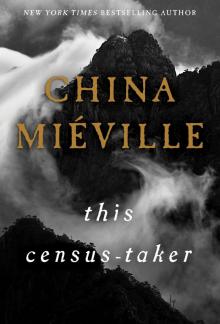 This Census-Taker
This Census-Taker Jack
Jack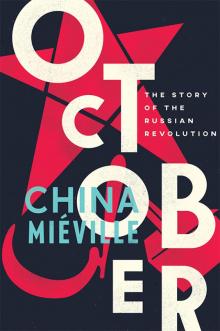 October: The Story of the Russian Revolution
October: The Story of the Russian Revolution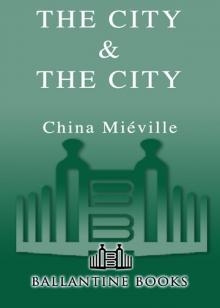 The City & the City
The City & the City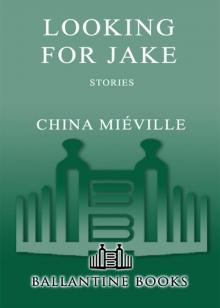 Looking for Jake: Stories
Looking for Jake: Stories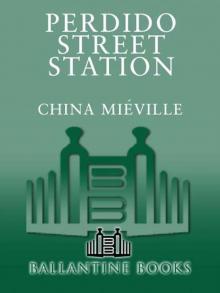 Perdido Street Station
Perdido Street Station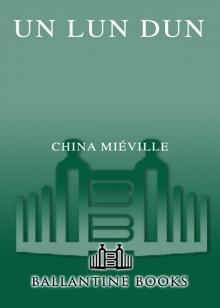 Un Lun Dun
Un Lun Dun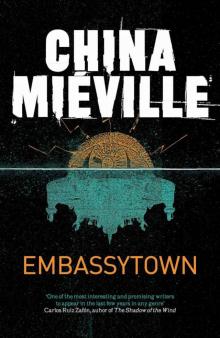 Embassytown
Embassytown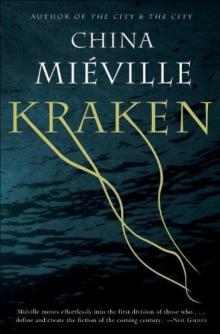 Kraken
Kraken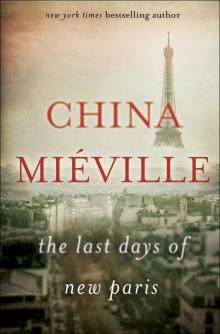 The Last Days of New Paris
The Last Days of New Paris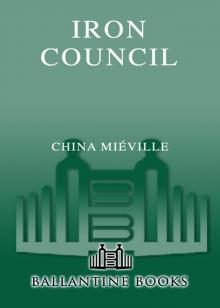 Iron Council
Iron Council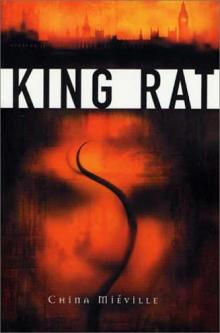 King Rat
King Rat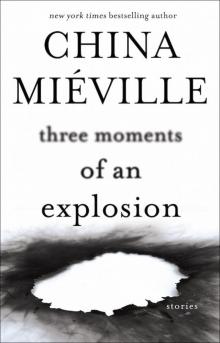 Three Moments of an Explosion
Three Moments of an Explosion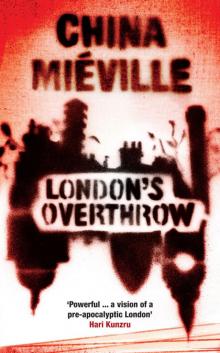 London's Overthrow
London's Overthrow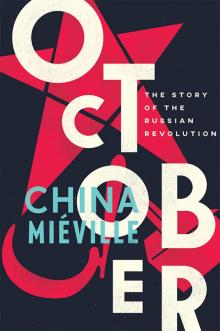 October
October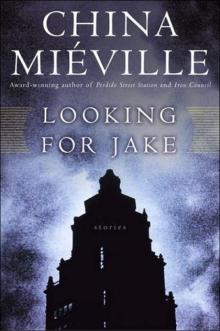 Jack (new crobuzon)
Jack (new crobuzon)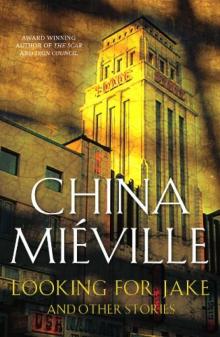 Looking for Jake and Other Stories
Looking for Jake and Other Stories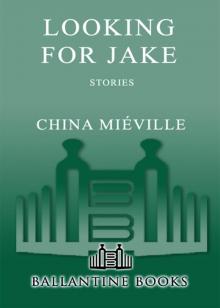 Looking for Jake
Looking for Jake